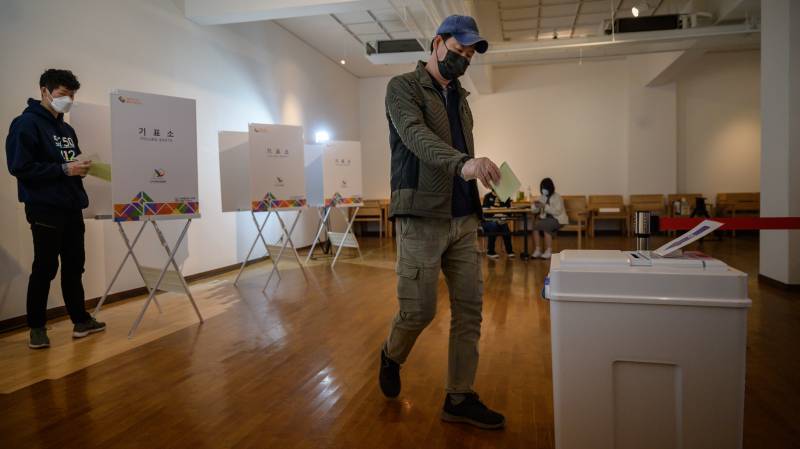South Koreans head to polls despite global pandemic

Stay tuned with 24 News HD Android App

South Korean voters turned out in force Wednesday despite the coronavirus threat, putting on compulsory face masks and gloves to cast their ballots in a parliamentary election.
South Korea is among the first countries with a major virus outbreak to hold a national vote since the global pandemic began, and a raft of safety measures were in place around the poll.
The parliamentary election -- widely expected to bolster the ruling Democratic party's position -- kicked off with 43.9 million voters eligible to cast ballots.
Voters in obligatory masks lined up at least one metre (three feet) apart outside polling stations and had their temperatures checked before being allowed in.
All had to clean their hands with sanitiser and don plastic gloves, while those with fevers cast their ballots in separate booths that were disinfected after each use.
"It is done very well," said 80-year-old voter Kim Gwang-woo.
"Because of the coronavirus, people are keeping their distance and everyone is wearing gloves."
For a time, the country had the world's second-largest outbreak, before it was largely brought under control through widespread testing and a contact-tracing drive, along with widely observed social distancing.
Those self-quarantining at home will be allowed to vote immediately after the polls close at 6:00 pm (0900 GMT), as long as they do not show virus symptoms, and must return to their residences by 7:00 pm.
Special polling stations were set up at eight central quarantine facilities at the weekend to enable the confined to vote.
But anyone who is staying at home and has developed symptoms is effectively disenfranchised.
Campaigning was also affected by the outbreak: instead of the traditional handshakes and distributing of name cards, candidates kept their distance from citizens, bowing and offering an occasional fist bump.
Many turned to online media such as YouTube and Instagram to connect with voters, while some even volunteered to disinfect parts of their constituencies.
A survey conducted by Gallup Korea last week showed that 27 percent of respondents were reluctant to vote due to the epidemic.
But 72 percent said they were not worried, and a high turnout had been expected after 11.7 million people, including President Moon Jae-in, voted early over the weekend.
Turnout had reached 56.5 percent at 3:00 pm, 10 percentage points up on the same time at the last parliamentary elections in 2016.
Approval rating
On the other side of the Demilitarized Zone that divides the peninsula, North Koreans marked in subdued fashion the birthday of late founding leader Kim Il Sung, with mask-wearing citizens laying flowers before his statue.
The anniversary is the most important date in the North Korean political calendar, but Pyongyang has cancelled several elements of the annual commemorations as it enforces strict anti-coronavirus measures.
South Korea's relatively quick and effective handling of the epidemic has been a boon for the left-leaning Moon ahead of the vote, largely seen as a referendum on his performance.
Just a few months ago he was assailed by critics over sluggish economic growth and his dovish approach to the nuclear-armed North.
But South Korea on Wednesday announced 27 new virus cases -- the seventh consecutive day with fewer than 40. Overall, the country has had nearly 11,000 infections and 225 deaths.
Kim Ki-chul, 33, said the recent falls in new cases encouraged him to come out to cast his ballot.
"Compared to the way the epidemic has been handled in other countries, South Korea showed outstanding disinfecting and containment capabilities, which increased my trust in the government," he added.
Moon's approval rating has jumped from 41 percent in late January to 57 percent last week, according to Gallup polls.
Moon's position is not at issue as he is directly elected, but while his Democratic party is the largest in parliament it does not hold a majority, relying on minority support to pass legislation.
The country uses a mix of first-past-the-post constituencies and proportional representation, and some high school students were voting for the first time after Seoul lowered the age limit from 19 to 18.
South Korea bans opinion polls in the week before an election, but the last available gave the Democratic party 44 percent support, a huge lead over the main conservative opposition United Future Party, on 23 percent.
